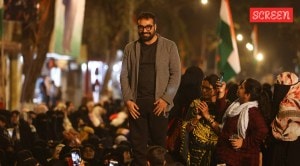Desperate Sharon ties Israel in a knot
A week ago, when Prime Minister Ariel Sharon launched Israel’s biggest military operation in West Bank since the 1967 West Asia war, he...

A week ago, when Prime Minister Ariel Sharon launched Israel’s biggest military operation in West Bank since the 1967 West Asia war, he envisioned an open-ended assault on Palestinian gunmen and suicide bombers.
Now the retired general’s plan has been undermined — in part by his own miscalculations, in part by opposition from an ally whose anti-terrorist crusade he identifies with his own: US President George W. Bush.
Bush’s call on Thursday for Israel to withdrawal from Palestinian-ruled areas of the West Bank and his decision to dispatch Secretary of State Colin L. Powell to the region next week has put Sharon under pressure to bring Operation Defensive Shield to a halt.
Israeli officials acknowledge that Sharon has little choice but to abandon, for now, his strategy of isolating Arafat and trying to crush his militant supporters.
But suspending an offensive that has broad support among Israelis will be politically risky. After Bush’s speech, which set no deadline for withdrawal, Sharon’s office issued a terse announcement that the assault will continue.
General Giora Eiland, a member of the army general staff, acknowledged that ‘‘we might have to stop this operation a little sooner’’ than planned because of Powell’s peace mission. Other officials said they expected a partial withdrawal to be under way by the time Powell arrives.
‘‘The slow-sinking sands in the hourglass of Operation Defensive Shield have been replaced by a clicking stopwatch,’’ military analyst Hemi Shalev wrote Friday in the Israeli newspaper Maariv. ‘‘Instead of an orderly, planned military operation, the (Army) will have to hurry to do what it can.’’
Sharon’s impatience with half measures was shared by most Israelis. A nationwide poll, taken as the latest offensive got under way and published Friday in the Yedioth Ahronoth newspaper, gave him a 62 per cent approval rating.
Over the past week, Israel has called up 33,000 reservists and sent armoured vehicles into every major West Bank city. Israeli troops have killed more than 70 Palestinian militants and seized piles of weapons, including 50 anti-tank grenades, nine bombs and nearly 2,000 guns. More than 900 Palestinians are being detained. Measured against Sharon’s professed aim to destroy the Palestinians’ ‘‘terrorist infrastructure’’, these gains are modest. Israeli newspapers say no more than 110 of the detainees can be linked to terrorist acts.
‘‘We are reaching into the infrastructure and disrupting it,’’ said Danny Ayalon, Sharon’s senior foreign policy adviser. ‘‘But if we stop halfway, the terrorists will bounce back at us as soon as we pull out. This will be detrimental to any kind of peace effort. If we don’t uproot the terror, we’ll have no chance for a real ceasefire.’’
Bush has voiced sympathy for Israel’s efforts to go after terrorists. But he intervened, US officials said, because the conflict was threatening to spill beyond Israel’s borders, undermine friendly governments in Egypt and Jordan, and thwart Washington’s effort to build consensus for a military attack on Iraq. Israeli critics say Sharon brought the pressure on himself by inciting protests throughout the Arab world and Europe.
Critics say Sharon might have weathered the storm had he not made two blunders: He sent tanks to Church of the Nativity. And his troops seized Arafat’s headquarters and cut him off from visitors. ‘‘Sharon can blame only himself for shortening the (army’s) window of time,’’ columnist Nahum Barnea wrote Friday in Yedioth Ahronoth.
Photos


- 01
- 02
- 03
- 04
- 05




























